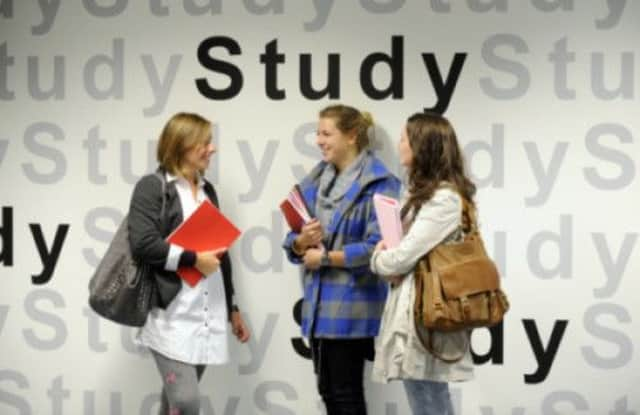Scottish universities social mix ‘changed little’


Research by Edinburgh University found the composition of students by social class had “changed little” across the UK, regardless of whether or not fees were charged.
The analysis of university application figures between 1996 and 2010 showed that, while devolution had led to diverging policies on higher education, there had been a limited impact, with national differences in tuition fees failing to alter social inequalities.
Advertisement
Hide AdAdvertisement
Hide AdThe study, by the university’s Centre for Educational Sociology, which was funded by charitable trust the Nuffield Foundation, also found those from ethnic minority backgrounds in Scotland were “more disadvantaged” relative to their white peers than in other parts of the UK when it came to winning a place at university.
It said privately educated students remained “unevenly distributed” across institutions, with numbers concentrated in older universities.
David Raffe, professor of sociology of education at Edinburgh University, who led the study, said: “Our findings provide little comfort either for the market-led philosophy, which is driving higher education in England, or for the claim that free tuition in Scotland promotes wider access for working-class students.
“Our research suggests that student choices do not drive improvement in higher education because they are strongly influenced by universities’ age and status, and that markets actually reinforce established academic hierarchies.
“There is little evidence of change in social class inequalities either in access to higher education as a whole or in entry to higher-status universities, including in Scotland where fees for full-time students have been abolished.”
Students elsewhere in the UK pay fees – something Scots have not had to do since 2008.
The Edinburgh University study did not take account of the impact of higher-rate fees of up to £9,000 a year, which were introduced in 2012 south of the Border and for students from the rest of the UK studying in Scotland.
Referring to 1996-2010, the report said: “This period was one of expansion in UK higher education. The number of entrants rose by 56 per cent in England, 37 per cent in Wales, 50 per cent in Northern Ireland and 33 per cent in Scotland.
Advertisement
Hide AdAdvertisement
Hide Ad“Our analysis shows that while students from all social classes benefited from this expansion, the share of higher education places filled by each social class changed very little.
“The divergent policies for student fees did not result, as might have been expected, in a greater widening of access in Scotland. Nor did the changing fee differentials between Wales and England increase social class inequalities in Wales, as some commentators had feared.”
The new study followed an article in The Scotsman last month by Professor Sheila Riddell, of Edinburgh University’s School of Education, in which she said free tuition had not “markedly altered” the recruitment of those from the poorest backgrounds. She said the system continued to favour the “most advantaged”, leaving a need to “re-examine the causes and consequences of social inequality”.
The study published yesterday said that, across the UK, applicants from “professional and managerial-class” backgrounds had higher success rates when it came to winning a place at university than those from working-class backgrounds. White applicants had higher success rates than ethnic minorities.
Robin Parker, president of the National Union of Students (NUS) in Scotland, said: “This report shows the myth in the idea that tuition fees somehow widen access. It’s always been obvious that burdening our poorest students with tens of thousands of pounds of fees wouldn’t make anyone more likely to go to college or university, but this report is proof, if proof were needed.”
A spokeswoman for umbrella body Universities Scotland said: “There are 2,000 more students from the most deprived areas of Scotland studying in our universities now compared to seven years ago.
“Universities are committed to doing all they can, but widening access is a complex challenge with few quick wins, which is why we feel a holistic approach, including schools, colleges, universities and government, is necessary.”
A Scottish Government spokeswoman said it “continues to be committed to widening access to ensure that education in Scotland is based on the ability to learn, not the ability to pay”.
Advertisement
Hide AdAdvertisement
Hide AdA number of commitments universities must fulfil in return for Scottish Government funding are expected to be published today. They will help create an additional 700 university places for the poorest students and 1,020 for those moving between college and university.
SEE ALSO: